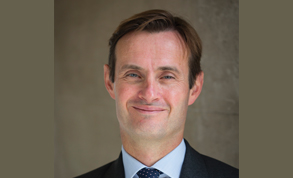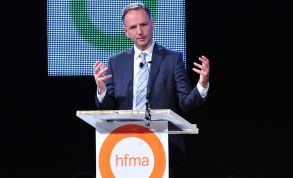Kelly: NHS ended year with underspend
At the bodies’ board meeting in common on 24 June, Mr Kelly (pictured) said the draft year-end position was an underspend of £244m before technical adjustments. Clinical commissioning groups and providers had initially forecast they could overspend by £1.5bn.
The government had made available substantially more funding than initially planned as the year progressed, he said. ‘Against the money we gave to systems – where the bulk of the money goes – they basically delivered a surplus of around £250m against money provided, which was close to £138bn. So, that’s a really effective use of resource.’
Papers tabled at the board show a higher aggregate underspend, but he explained that this was because the overall funding was much higher than initially planned. Providers, for example, showed an aggregate underspend of more than £1.3bn, once additional funding including top-ups and reimbursement in the second half of the year were taken into account.
Providers incurred costs of £2.2bn to cover higher employers’ contributions to pensions. Providers were not asked to plan for this and received income to fully match the cost. The financial impact of Covid on the provider sector was £7.2bn at year-end. This included an estimated £2bn of lost income, £2.7bn of additional pay costs, and £2.4bn of other Covid costs.
CCGs had additional Covid costs of £2.5bn of which £1.7bn relates to enhanced community support. Six of the 42 systems reported a year-end deficit, with only one greater than £10m.
Mr Kelly added that the government had provided significant additional funds for national investments, such as increasing capacity through contracts with independent hospitals, the enhanced discharge scheme, and the Nightingale hospitals.
‘When these were agreed there was a lot of uncertainty, so we were making estimates of potential cost,’ he said.
‘The government provided funding against those initial estimates and our commitment was to only use it to the degree that was necessary. Against the ring-fenced allocations, we have come in under the total amount initially estimated, which I think is a reflection of good, tight operational and financial management control.’
The national bodies also held provisions against risk of around £1bn. ‘We said to systems to plan and live within the envelopes we gave them, but there was significant uncertainty around things like annual leave and a series of legal cases we were in the process of closing out. But we have not needed to deploy all of the risk provision that we had been holding.
'Broadly, systems spent the money we gave them, there was good financial control, and we have not needed to deploy all the risk provision we have held.’
The chief financial officer added that significant additional capital investment had been released. This was targeted not only on dealing with the consequences of Covid, such as increasing bed numbers and diagnostic equipment, but also to catch up on backlog maintenance, expand A&E capacity, and to begin to get rid of mental health dormitories. The service was on track with the investment plans in all these projects, he said – the draft outturn position of £7.1bn is an underspend of 1%.
Mr Kelly was asked about progress on diagnostic hubs. ‘We have a business case we are just about to put to the Department of Health and Treasury,’ he said. ‘If that gets approved – I think there’s an investment committee with the Department in about two weeks – that would enable us to put a community diagnostic hub in every system in the country. That would increase our diagnostic capacity around things like CT and MRI by about 8% compared with today.’

The board also approved the NHS system oversight framework for 2021/22, which describes how NHS England and NHS Improvement will oversee integrated care systems, CCGs and trusts. There are new financial metrics, covering performance against financial plan, the underlying financial position, run rate expenditure, and the overall trend in reported financial position.
The meeting was Simon Stevens’ last as NHS chief executive, and he said legislation would be brought forward soon to put systems onto a statutory footing. A board paper summarised the main changes. ‘We have a commitment from government that the legislation will have its second reading before Parliament goes down on 2 July,’ Sir Simon (pictured) added.
Related content
We are excited to bring you a fun packed Eastern Branch Conference in 2025 over three days.
This event is for those that will benefit from an overview of costing in the NHS or those new to costing and will cover why we cost and the processes.